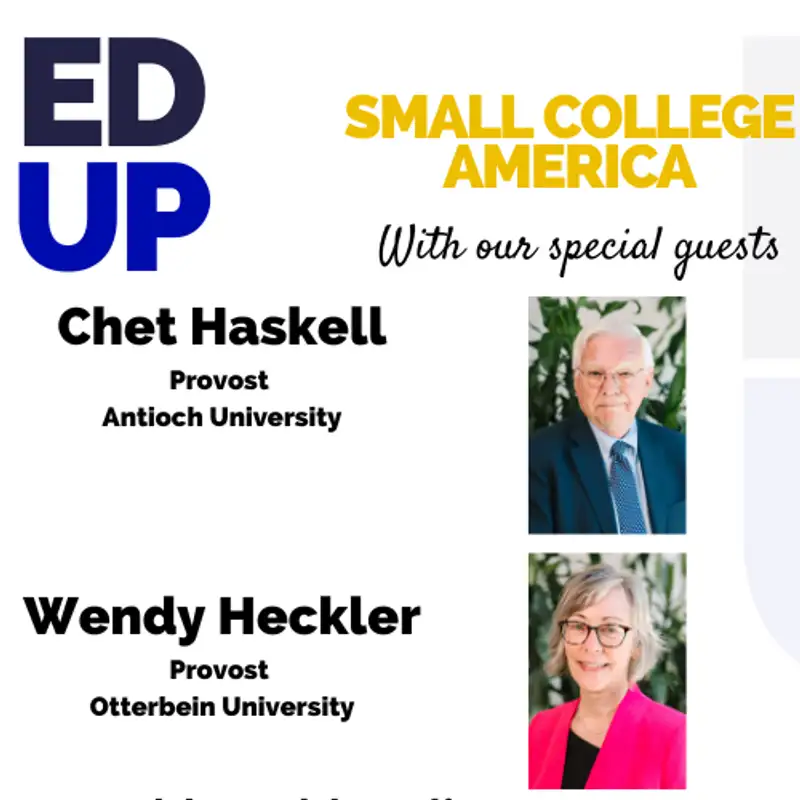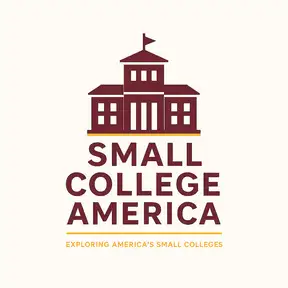Small College America - Chet Haskell and Wendy Heckler
Our guests today are Wendy Sherman Heckler from Otterbein University and Chet Haskell of Antioch University. They discussed their unique partnership, the Coalition for the Common Good. They also discussed the growth model of their shared services operation, the transition of Antioch from a financially constrained institution to a new model, and the expansion of the Higher Education Partners Coalition. The conversation also touched on the importance of trust, clear communication, and stakeholder buy-in in building the coalition, as well as the financial sustainability and pathways for students in their institutions.
Wendy Sherman Heckler, Provost and Senior Vice President for Academic Affairs at Otterbein University, and Chet Haskell, Vice Chancellor for Academic Affairs and University Provost at Antioch University. The hosts and guests briefly discuss the Coalition for Common Good, an innovative national higher education system founded in 2023 by their institutions.
Interview Key Topics of Discussion
Antioch and Otterbein's Unique Partnership Coalition for the Common Good
Wendy and Chet discussed the unique partnership between Antioch and Otterbein, which they referred to as the "coalition for the common good." They clarified that this model is not a traditional merger but rather a collaborative relationship where both institutions maintain their separate identities and statuses. The goal is to grow this relationship into a multilateral one, with each institution maintaining its independence. They also discussed how this partnership allows them to specialize in their respective areas, with Antioch focusing on adult learners and Otterbein on undergraduates. The shared mission of higher education is central to their collaboration.
Scaling Shared Services and Challenges
Chet discussed the growth model of their shared services operation, emphasizing the importance of scaling their operations. He highlighted their successful use of Zoom during the Covid-19 pandemic, which allowed them to transition from 75% on-campus instruction to 25% post-pandemic. Dean expressed interest in the unique model, asking about the main challenges in creating the coalition and the stakeholder buy-in. Wendy responded, noting the challenges of communicating a positive change in a highly competitive environment like higher education, and the importance of trust and clear communication in building the coalition.
Antioch's Financial Model Transition
Chet discussed Antioch's transition from being a financially constrained institution to adopting a new model. This involved setting up a committee, signing NDAs, and conducting extensive internal and external communication about their plans. The goal was to sustain and grow their programs, despite limited financial resources. Dean then inquired about the start of this process, to which Chet and Wendy provided details, indicating that preliminary discussions began in spring/summer of 2021, followed by public announcements in July 2022 and the completion of the transaction in June 2023.
Expanding Board and Stakeholders
Wendy and Chet discussed the process of expanding their institution's board of trustees to include faculty and student trustees, and the importance of involving wider circles of people in the decision-making process. They also touched on the complexities of working with accreditors and the need to build relationships with lawyers, creditors, and other key stakeholders. Wendy emphasized the importance of understanding the fragility of private nonprofit institutions in the current environment. The conversation concluded with Kent. expressing interest in the financial implications and sustainability of the partnership between the two institutions.
Expanding Graduate Programs and Pathways
Wendy discussed pathways for students, specifically mentioning a program where Otterbein students can take 9 credit hours of graduate coursework as undergrads that can double count towards both degrees. She shared that this initiative has led to growing enrollments, and students are showing interest in these pathways to graduate programs. The program is expanding, with 15 pathways now available. Chet agreed with the model, stating it's beneficial for both institutions and expands their reach. He also mentioned the creation of a graduate school of nursing and health professions, which is up and running. Dean was about to discuss the investment aspect of the program.
Strategic Partnerships and Financial Sustainability
Wendy and Chet discussed the growth and financial sustainability model of their institution, Otterbein, which has led to strategic partnerships with various organizations. They highlighted the importance of these partnerships in community development and workforce development, generating revenue streams. Dean asked about the progress and expectations of the partnership, to which Wendy and Chet responded positively, noting the innovation and creativity of the model. They also mentioned some surprises, such as the unexpected interest of Otterbein faculty in working at Antioch, and the positive impact of the partnership on faculty collaboration.
Expanding Higher Education Partners Coalition
The discussion focuses on the expansion of the Higher Education Partners Coalition. Chet and Wendy confirm that they are in active discussions with one institution and exploring opportunities with a couple of others, aiming to include high-quality undergraduate institutions from different locations. They emphasize that while there is interest, the coalition is not suitable for all institutions, particularly those in extreme financial distress. Both express excitement about introducing new members to the coalition but indicate that they are not as close to announcing new members as they would like. They welcome inquiries from interested institutions and mention that their leadership often discusses the coalition at conferences, generating further interest.
Wendy Sherman Heckler, Provost and Senior Vice President for Academic Affairs at Otterbein University, and Chet Haskell, Vice Chancellor for Academic Affairs and University Provost at Antioch University. The hosts and guests briefly discuss the Coalition for Common Good, an innovative national higher education system founded in 2023 by their institutions.
Interview Key Topics of Discussion
Antioch and Otterbein's Unique Partnership Coalition for the Common Good
Wendy and Chet discussed the unique partnership between Antioch and Otterbein, which they referred to as the "coalition for the common good." They clarified that this model is not a traditional merger but rather a collaborative relationship where both institutions maintain their separate identities and statuses. The goal is to grow this relationship into a multilateral one, with each institution maintaining its independence. They also discussed how this partnership allows them to specialize in their respective areas, with Antioch focusing on adult learners and Otterbein on undergraduates. The shared mission of higher education is central to their collaboration.
Scaling Shared Services and Challenges
Chet discussed the growth model of their shared services operation, emphasizing the importance of scaling their operations. He highlighted their successful use of Zoom during the Covid-19 pandemic, which allowed them to transition from 75% on-campus instruction to 25% post-pandemic. Dean expressed interest in the unique model, asking about the main challenges in creating the coalition and the stakeholder buy-in. Wendy responded, noting the challenges of communicating a positive change in a highly competitive environment like higher education, and the importance of trust and clear communication in building the coalition.
Antioch's Financial Model Transition
Chet discussed Antioch's transition from being a financially constrained institution to adopting a new model. This involved setting up a committee, signing NDAs, and conducting extensive internal and external communication about their plans. The goal was to sustain and grow their programs, despite limited financial resources. Dean then inquired about the start of this process, to which Chet and Wendy provided details, indicating that preliminary discussions began in spring/summer of 2021, followed by public announcements in July 2022 and the completion of the transaction in June 2023.
Expanding Board and Stakeholders
Wendy and Chet discussed the process of expanding their institution's board of trustees to include faculty and student trustees, and the importance of involving wider circles of people in the decision-making process. They also touched on the complexities of working with accreditors and the need to build relationships with lawyers, creditors, and other key stakeholders. Wendy emphasized the importance of understanding the fragility of private nonprofit institutions in the current environment. The conversation concluded with Kent. expressing interest in the financial implications and sustainability of the partnership between the two institutions.
Expanding Graduate Programs and Pathways
Wendy discussed pathways for students, specifically mentioning a program where Otterbein students can take 9 credit hours of graduate coursework as undergrads that can double count towards both degrees. She shared that this initiative has led to growing enrollments, and students are showing interest in these pathways to graduate programs. The program is expanding, with 15 pathways now available. Chet agreed with the model, stating it's beneficial for both institutions and expands their reach. He also mentioned the creation of a graduate school of nursing and health professions, which is up and running. Dean was about to discuss the investment aspect of the program.
Strategic Partnerships and Financial Sustainability
Wendy and Chet discussed the growth and financial sustainability model of their institution, Otterbein, which has led to strategic partnerships with various organizations. They highlighted the importance of these partnerships in community development and workforce development, generating revenue streams. Dean asked about the progress and expectations of the partnership, to which Wendy and Chet responded positively, noting the innovation and creativity of the model. They also mentioned some surprises, such as the unexpected interest of Otterbein faculty in working at Antioch, and the positive impact of the partnership on faculty collaboration.
Expanding Higher Education Partners Coalition
The discussion focuses on the expansion of the Higher Education Partners Coalition. Chet and Wendy confirm that they are in active discussions with one institution and exploring opportunities with a couple of others, aiming to include high-quality undergraduate institutions from different locations. They emphasize that while there is interest, the coalition is not suitable for all institutions, particularly those in extreme financial distress. Both express excitement about introducing new members to the coalition but indicate that they are not as close to announcing new members as they would like. They welcome inquiries from interested institutions and mention that their leadership often discusses the coalition at conferences, generating further interest.

